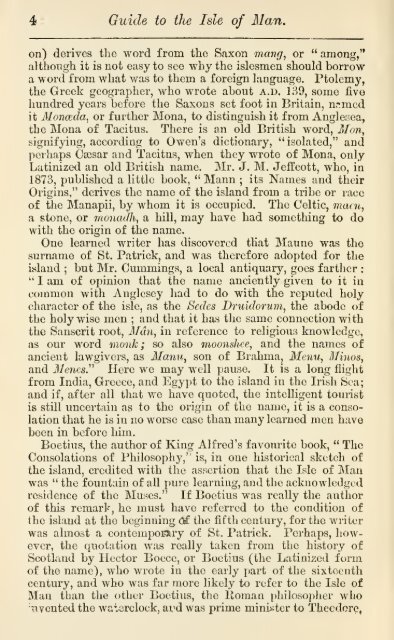Ward & Lock's descriptive and pictorial guide to the Isle of Man ...
Ward & Lock's descriptive and pictorial guide to the Isle of Man ...
Ward & Lock's descriptive and pictorial guide to the Isle of Man ...
Create successful ePaper yourself
Turn your PDF publications into a flip-book with our unique Google optimized e-Paper software.
•Guide4<strong>to</strong> <strong>the</strong> <strong>Isle</strong> <strong>of</strong> <strong>Man</strong>.on) derives <strong>the</strong> word from <strong>the</strong> Saxon mang, or " among,"although it is not easy <strong>to</strong> see why <strong>the</strong> islesmen should borrowa word from what was <strong>to</strong> <strong>the</strong>m a foreign language. P<strong>to</strong>lemy,<strong>the</strong> Greek geographer, who wrote about a.d. 139, some fivehundred years before <strong>the</strong> Saxons set foot in Britain, nrmcdit Monceda, or fur<strong>the</strong>r Mona, <strong>to</strong> distinguish it from Anglesea,<strong>the</strong> Mona <strong>of</strong> Tacitus. There is an old British word, IJon,signifying, according <strong>to</strong> Owen's dictionary, "isolated," <strong>and</strong>perhaps Caesar <strong>and</strong> Tacitus, when <strong>the</strong>y wrote <strong>of</strong> Mona, onlyLatinized an old British name. Mr. J. M. Jeffcott, who, in1873, published a little book, " <strong>Man</strong>n;its Names <strong>and</strong> <strong>the</strong>irOrigins," derives <strong>the</strong> name <strong>of</strong> <strong>the</strong> isl<strong>and</strong> from a tribe or race<strong>of</strong> <strong>the</strong> <strong>Man</strong>apii, by whom it is occupied. The Celtic, mcun,a s<strong>to</strong>ne, or moncn'lh, a hill, may have had something <strong>to</strong> dowith <strong>the</strong> origin <strong>of</strong> <strong>the</strong> name.One learned writer has discovered that Maune was <strong>the</strong>surname <strong>of</strong> St. Patrick, <strong>and</strong> was <strong>the</strong>refore adopted for <strong>the</strong>isl<strong>and</strong> ;but Mr. Cummings, a local antiquary, goes far<strong>the</strong>r :" I am <strong>of</strong> opinion that <strong>the</strong> name anciently given <strong>to</strong> it incommon with Anglesey had <strong>to</strong> do with <strong>the</strong> reputed holycharacter <strong>of</strong> <strong>the</strong> isle, as <strong>the</strong> Sales Druidorum, <strong>the</strong> abode <strong>of</strong><strong>the</strong> holy wise men;<strong>and</strong> that it has tlie same connection with<strong>the</strong> Sanscrit root, <strong>Man</strong>, in reference <strong>to</strong> religious knowledge,as our word monk; so also moonslice, <strong>and</strong> <strong>the</strong> names <strong>of</strong>ancient lawgivers, as <strong>Man</strong>n, son <strong>of</strong> Brahma, Menu, Minos,<strong>and</strong> Menus.'" Here we may well pause. It is a long flightfrom India, Greece, <strong>and</strong> Egypt <strong>to</strong> <strong>the</strong> isl<strong>and</strong> in <strong>the</strong> Irish Sea;<strong>and</strong> if, after all that we have quoted, <strong>the</strong> intelligent <strong>to</strong>uristis still uncertain as <strong>to</strong> <strong>the</strong> origin <strong>of</strong> <strong>the</strong> name, it is a consolationthat he is in no worse case than many learned men havebeen in before him.Boetius, <strong>the</strong> author <strong>of</strong> King Alfred's favourite book, " TheConsolations <strong>of</strong> Philosophy," is, in one his<strong>to</strong>rical sketch <strong>of</strong><strong>the</strong> isl<strong>and</strong>, credited with <strong>the</strong> assertion that <strong>the</strong> <strong>Isle</strong> <strong>of</strong> <strong>Man</strong>was " <strong>the</strong> fountain <strong>of</strong> all pure learning, <strong>and</strong> <strong>the</strong> acknowledgedresidence <strong>of</strong> <strong>the</strong> Muses." If Boetius was really <strong>the</strong> author<strong>of</strong> this remark, he must have referred <strong>to</strong> <strong>the</strong> condition <strong>of</strong><strong>the</strong> isl<strong>and</strong> at <strong>the</strong> beginning (tf <strong>the</strong> fifth century, for <strong>the</strong> writerwas almost a contempoEJiry <strong>of</strong> St. Patrick. Perhaps, however,<strong>the</strong> quotation was really taken from <strong>the</strong> his<strong>to</strong>ry <strong>of</strong>Scotl<strong>and</strong> by Hec<strong>to</strong>r Boecc, or Boetius (<strong>the</strong> Latinized form<strong>of</strong> <strong>the</strong> name), who wrote in <strong>the</strong> early part <strong>of</strong> <strong>the</strong> sixteenthcentury, <strong>and</strong> who was far more likely <strong>to</strong> refer <strong>to</strong> <strong>the</strong> <strong>Isle</strong> <strong>of</strong><strong>Man</strong> than <strong>the</strong> o<strong>the</strong>r Boetius, <strong>the</strong> Iloman philosopher whonvcnted <strong>the</strong> waterclock, ai^d was prime minister <strong>to</strong> Thecdore,
















